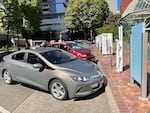Oregon’s electric vehicle sales got a boost in 2021 and with more tax credits and fast chargers on the way, officials say they expect the trend to continue.
According to Atlas EV Hub, a national data firm that tracks EV sales, Oregon was No. 2 in the nation in 2021, behind California, for the share of new vehicles sold that are electric. Oregon is currently tied for the No. 2 spot in 2022 with Hawaii and Washington.

Electric vehicles line up at Downtown Portland's Electric Ave. The space offers EV drivers fast chargers for many different charging ports.
Monica Samayoa / OPB
Oregon Department of Transportation spokesperson Matt Noble said that as of September, there are 57,700 registered EVs in the state, with an average of 1,000 added EV registrations per month in 2022. That number, he said, is not specifically tied to new vehicles sold. A resident could have purchased their EV in another state and registered it in Oregon.
“The 2023 outlook is looking strong,” he said. “That tells us that each month we should see growth in that number, which then translates into an accelerated adoption rate for people choosing an EV as their next vehicle.”
Oregon’s transportation sector accounts for 40% of the state’s total greenhouse gas emissions, the largest single source, and the race to reduce those emissions has taken off along the West Coast.
Recently, Oregon aligned with its neighbors and adopted rules requiring car manufacturers to increase the number of zero-emission vehicles available for sale starting in 2035. That would end the sale of new gas- and diesel-powered vehicles that year. Oregon also has two electric vehicle rebates — the standard rebate and charge ahead rebate, which combined could total up to $7,500 for a new electric vehicle depending on a buyer’s income.
Rachel Sakata, the Oregon Department of Environmental Quality’s senior air quality planner, said the rebate program began in 2018 and has since issued more than $63 million in rebates, making Oregon one of the top EV sales locations in the country.
“We are going to continue to see robust participation,” she said. “We have a very generous electric vehicle rebate for folks. Then there’s also the federal tax credit that’s going to be available for anyone who purchases certain types of electric vehicles.”
The federal Inflation Reduction Act, signed into law last year, is set to invest $369 billion in clean energy and climate action. It offers households many incentives, including federal tax credits of up to $7,500 for a new electric vehicle or $4,000 for a used one. Qualified Oregonians could get up to $15,000 if they stack the federal and state rebates.
Sakata said she expects more residents to continue adopting electric vehicles as they become more available.
“We may even be at risk of running out of funding because so many people are taking advantage of it, which I joke that it’s a good problem to have because that means more and more people are transitioning from their gasoline vehicles to a cleaner vehicle,” she said.
Sakata said DEQ is also working on an education and outreach campaign in low- and moderate-income communities, rural communities and communities of color to increase awareness and access to the rebates, and to answer questions residents may have about owning an EV.
Barriers like affordability, demand and access to charging stations have created a gap for these communities in adopting electric vehicles. A 2021 report from the Oregon Department of Energy showed 78% of registered EVs are in wealthy and white areas.

A hybrid vehicle being charged at a home charging station, Dec. 1, 2022. The single-family home had been retrofitted to reduce the family’s carbon footprint, and is equipped with solar panels, hybrid heat pump hot water heater, high-efficiency appliances and lighting, an electric vehicle charging station and a whole-home battery storage system.
Kristyna Wentz-Graff / OPB
These communities also lack access to EV charging stations, Noble said. But with ODOT set to invest $100 million over the next five years to build more fast charging stations along the state’s major roadways, Noble expects that change.
“About $35 million of that will go to closing those charging gaps in multi-family homes, rural areas and underserved communities to fill in the gaps that the private sector has seen less investment in,” he said.
There are currently 480 DC fast charging stations in Oregon. These high-power chargers can fill an EV to near capacity in about 20 minutes. Noble said the number of those chargers could double with the Infrastructure Act funding.
“We will be aggressively pursuing those grants as well so we can have as much funding to work with so we can really meet Oregon’s needs,” he said.
